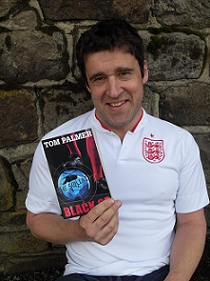Tom Palmer shows how, by seeking out unexpected working partnerships, a children’s author can open up mutually rewarding and productive markets and draw in new young readers.

I have managed to make a living as a full-time children’s author for eight years. As everyone who has tried it knows, it is not easy to earn enough money to live on from being a writer. You’re forever in fear. Forever asking yourself questions … How long will people want to buy your books? Will school events dry up as finances tighten and the political landscape changes? There is little respite, even if you are living the dream. Which I am.
That’s why I spend a lot of time trying to think of ways I can attract interest to my books, so that people will continue to buy and borrow them. And so schools will keep paying me to visit. One of the most successful ways I have found to do this is to give.
Looking for partnerships There are a lot of organisations, charities and companies who would benefit from working with a children’s author. But who are they? What can you give them? And, what can they give you? I have developed relationships with several organisations – large and small – giving and taking. In partnership. As a result of those partnerships, I have boosted my longevity as a children’s author.
Each partnership is different and each evolves in its own unpredictable way. But it usually starts with a series of questions that I ask myself, and which I suggest you ask yourself. Here is a plan of action:
- Think about what you’ve written. List subjects, settings, themes, ideas. And dig deep. Text your friends and family. Your readers. Ask them what they think you write about
- Now look at your list. Are there natural partners for your work? (For instance, Beatrix Potter might have chosen the RSPCA, a pet shop chain or Animals & You magazine. Or she might not.)
- Suss out one or more partners whose work is linked to what you write about. Again, stretch it. Brainstorm; be creative. Have ideas that are stupid. Cross them out. Have more. There might be one that fits
- Think carefully about those potential partners. Go to their website. Watch them. What do they do? What do they want to achieve? Can you help them?
- Now think about what you could ask for from them. How can they help you to promote your books? Or, how can you link with them help you to promote your books?
Case study
Over the last decade I have worked successfully with the RAF Museums, England Rugby, the Premier League, Divine Chocolate, Leeds Schools Library Service and many others. Below are three different examples. They could help you see how to identify suitable partners that fit the writing and themes of your own books – ones you might approach as potential partners.
Fair trade chocolate
I was writing a book about football and fair trade for Puffin. It’s called Off Side and includes storylines relating to the trafficking of young African footballers and to fair-trade cocoa bean farming. I needed help to write it. A lot of help. From people who knew about football and chocolate in Africa.
So I did a bit of research. In fact, my wife did. She came up with Divine Chocolate who work with fair-trade farmers so that the likes of us can give them a fair wage for what they farm. I identified the Right to Dream football academy in Ghana. They look after gifted young child footballers and help protect them from being exploited by corrupt football agents. I contacted both, suggesting that I could help raise awareness of what they do. Could they explain it to me? Could they help me research and write a meaningful book? They said they could.
I went to Ghana at my own expense. I saw everything I needed to see. It was amazing. When I got home I promoted Divine and Right to Dream and the great work they do through writing my story. And my book continues to sell well because it was properly researched and I knew what I was talking about. Job done.
Ask yourself:
- Is there an activity or interest at the centre or on the margins of my book?
- Does a national or regional body administer that interest?
- Who can I work with? Who would be interested in my book?
Tom Palmer is the author of the Rugby Academy series (Barrington Stoke 2015) and three Puffin football series, Football Academy, Foul Play and The Squad. Foul Play (Puffin 2008) was shortlisted for the 2008 Blue Peter Book Award. His other books include Ghost Stadium (2013), Secret FC (2013) and Over the Line (2014), all published by Barrington Stoke. Typhoon, the latest in his Wings series, will be published in August 2016. Tom is Patron of Reading at three schools and is the Children’s Writer in Residence at the RAF Museum.
Find out more at tompalmer.co.uk, and follow him on Twitter @tompalmerauthor.
Comments